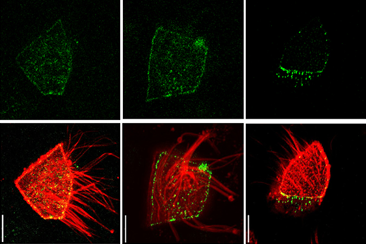Planar Cell Polarity (PCP) is a developmental process essential for embryogenesis and development of polarized structures in Metazoans. This signaling pathway involves a set of evolutionarily conserved genes encoding transmembrane (Vangl, Frizzled, Celsr) and cytoplasmic (Prickle, Dishevelled) molecules. Vangl2 is of major importance in vertebrate development as illustrated by its role during neural tube closure in human, mouse, Xenopus and zebrafish embryos.
In this collaborative study between the Borg (CRCM) and Kodjabachian (IBDM) groups, the investigators characterized an overlooked but conserved translational variant of Vangl2, the translation of which is initiated at an Isoleucine codon, some 50 amino-acids upstream of the canonical Methionine. Here, morpholino-mediated knockdown in Xenopus revealed its awesome power, as the translation of Vangl2-Long could be inhibited specifically, without altering the expression of canonical Vangl2. Analyses in polarized tissues revealed the importance of the long variant, indicating that Vangl2 and Vangl2-Long must collaborate to properly deliver PCP functions.




